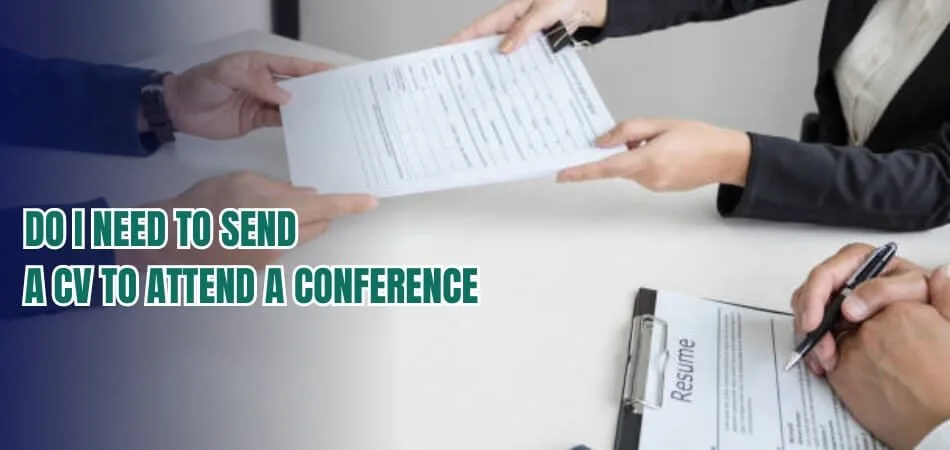A conference serves as a platform for presenting innovations, facilitating knowledge exchange, and networking. This type of gathering brings together professionals, experts, and enthusiasts interested in delving into the latest trends and research.
As you prepare to attend one, you might wonder, “Do I need to send a CV to attend a conference?”
It depends largely on the nature of the conference you plan to attend. In some academic, professional, or industry conferences, you may need to submit a CV for registration, especially if you’re presenting, seeking sponsorship, or networking for jobs. However, some events may only require registration and payment, and no CV is required.
To deal with this aspect of conference attendance successfully, continue reading our article for detailed insights and tips.
What is the Core Purpose of the Conference?
The purpose of conferences is to bring people together based on their shared interests and fields of study. Through discussions and presentations, new ideas emerge, creating an environment where professionals, academics, and enthusiasts can connect, learn, and exchange insights. These events encourage meaningful conversations that lead to innovation and growth.
This type of gathering focuses on collaboration and the exchange of knowledge. Speakers present their research, sparking curiosity and inspiring attendees to explore fresh perspectives. Whether in specialized fields or broad industries, conferences provide valuable learning experiences that keep participants updated on the latest advancements and trends.
Moreover, conferences serve as hubs for career development and professional networking. They offer opportunities to showcase work, receive constructive feedback, and connect with mentors or industry leaders. Many international conferences attract a diverse audience, bringing together experts from different backgrounds. Events like conferences in Canada create a space for valuable discussions and potential collaborations across various sectors.
In the end, these gatherings are about personal and professional growth. By engaging in discussions, exploring new ideas, and meeting like-minded individuals, attendees gain knowledge and connections that help shape their careers and contributions to their fields.
Requirements of Attending a Conference
An excellent opportunity to broaden your horizons is to attend a conference. However, it’s essential to be aware of the requirement to attend a conference and ensure you meet these criteria. By doing so, you can maximize your benefits and improve your experience.
- Registration: Early registration is often required to secure your spot. This can also come with the benefit of discounted rates.
- Conference Fee: Most events have a participation fee, which varies depending on the nature of the conference and its offerings.
- Submission of Materials: For presenters, submitting papers or abstracts by the deadline is crucial. This ensures your work is considered for inclusion.
- Preparation: Attendees should prepare by researching the schedule and speakers. This helps in choosing sessions that align with your interests.
- Networking Tools: Bringing business cards or a digital portfolio can facilitate networking. It’s a tangible way to share your contact information.
- Attire: Understanding the dress code, whether formal or casual, is important. It reflects respect for the event and its participants.
Taking part in a conference involves more than just showing up; it requires active preparation and participation. Having these requirements meet not only enriches your experience but also opens doors to new opportunities.
Different Types of Conferences You Can Attend
Conferences are full of opportunities, and exploring them can be like stepping into a kaleidoscope of possibilities. Connecting people, sharing knowledge, and inspiring innovation are the aims of each event. Here are some of the types of events you may attend.
Academic Conferences
These gatherings are a haven for scholars and researchers. They present findings, discuss theories, and critique each other’s work in a constructive environment. Networking with peers opens doors to collaborative research projects. It’s where theory meets dialogue, pushing the boundaries of knowledge.
Industry Conferences
Professionals from specific sectors converge to discuss trends, challenges, and advancements. These events often showcase new products or technologies, offering hands-on experiences. Networking and staying current with industry changes are crucial to career advancement. Attendees leave with actionable insights and strengthened professional networks.
Technology Conferences
A playground for tech-savvy conferences featuring the latest in software, hardware, and digital services. Startups and tech giants alike unveil groundbreaking products. Workshops and demos provide a deep dive into technical skills. It’s a glimpse into the future of technology.
Business Summits
This conference brings together thought leaders and entrepreneurs to discuss strategies for growth, leadership, and market expansion. A panel discussion will examine trends in global economics and business management. Networking events facilitate partnerships and mentorships. It’s a great place for developing business strategies and visionary leadership.
Creative Workshops and Conferences
Artists, writers, and designers gather to celebrate creativity and craftsmanship. Workshops offer hands-on learning in various mediums and techniques. Discussions revolve around inspiration, the creative process, and the business of art. It’s a space to ignite creativity and find one’s artistic tribe.
Sustainability and Environmental Conferences
Focusing on the planet’s future, these conferences tackle climate change, conservation, and sustainable living. Innovators share sustainable technologies and strategies for environmental stewardship. They promote a sense of global responsibility and collective action. It’s where green ideas translate into actionable solutions.
Each type of conference offers a unique blend of learning, networking, and growth opportunities. It doesn’t matter whether you are interested in expanding your knowledge, networking, or simply exploring new ideas, there are events out there for you.
Is a CV the Same as a Resume?
No, a CV is not the same as a resume. Both documents serve different purposes, focusing on different aspects of your background. Knowing these differences helps you present your qualifications effectively, especially when bringing a resume to a conference.
A CV is an extensive document that includes detailed information about your academic and professional history. It typically covers your education, research, publications, and relevant experiences. In contrast, a resume is concise, summarizing your skills and experiences tailored to a specific job.
When attending a conference, knowing whether to use a CV or a resume is essential. A CV may be required for academic events, showcasing your research credentials. However, bringing a resume to a conference can effectively highlight your relevant skills and experiences to potential employers.
Do I Need to Send a CV to Attend a Conference?
This will depend on the specific requirements of the conference you’re interested in attending. Several factors affect the need for a CV during the registration process, influencing whether it is necessary. Taking a closer look at these factors can help you determine if you need a CV.
Type of Conference
Academic, professional, or industry-focused events often require a CV. This document helps organizers understand your background. If you’re presenting, it showcases your expertise. For job seekers, it highlights relevant experience to potential employers.
Purpose of Attendance
If you’re there to present research, a CV can affirm your credentials. Seeking sponsorship? Your CV demonstrates value to sponsors. Networking for jobs? It opens doors by outlining your skills and achievements.
Registration Requirements
Some conferences have straightforward registration: just sign up and pay. Here, a CV isn’t needed-just your interest and payment suffice. These are usually more general in nature, focusing on attendance rather than contribution.
Event Structure
Workshops or breakout sessions may require a CV for participation. This helps coordinators match your skills with the right sessions. It ensures a productive experience for everyone involved. Essentially, your CV guides your event journey.
Organizer Preferences
Some organizers value a streamlined process, skipping CV collection. Others use CVs to curate a tailored attendee list, ensuring a high-caliber gathering. Your CV, in this case, acts as your ticket. Always check with the event’s guidelines.
Networking Opportunities
Conferences with a strong focus on career opportunities often request a CV. It facilitates matchmaking with potential employers or collaborators. Think of it as pre-networking, your CV speaking before you do. It’s a strategic move for career progression.
By understanding these factors, you’ll be prepared to attend any conference. No matter if you need to send a CV or not, knowing what to expect will set you up for success.
How to Prepare and Adjust Your CV for Conference Application?
An effective CV for a conference application requires attention to detail and a clear understanding of your goals. A well-tailored CV not only showcases your expertise and accomplishments but also aligns with the conference’s themes and expectations.
Here’s how to ensure your CV stands out and makes a strong impression.
Step 1: Know the Conference’s Focus
Start by researching the conference’s main themes, objectives, and audience. This knowledge allows you to highlight relevant experiences, skills, and achievements. Tailoring your CV to reflect the conference’s focus shows organizers you’re a perfect fit and deeply engaged with the subject matter.
Step 2: Highlight Relevant Experience
Identify the experiences and skills most relevant to the conference audience and objectives. Prioritize these in your CV, placing them where they’ll be noticed quickly. Use clear, concise language to describe your roles and achievements. This targeted approach demonstrates your suitability for the conference.
Step 3: Showcase Your Publications and Presentations
If you’ve published articles or delivered presentations, highlight these accomplishments. Focus on those most relevant to the conference’s theme. Provide titles, co-authors, and publication dates to offer a comprehensive view of your scholarly contributions. This section underscores your expertise and active participation in your field.
Step 4: Include Professional Affiliations
List memberships in professional organizations related to the conference theme. These affiliations show your commitment to your field and ongoing engagement with the community. It also indicates to organizers that you’re well-connected and serious about your professional development.
Step 5: Personalize Your Introduction
Craft a compelling introduction that encapsulates your professional identity and your interest in the conference. Explain briefly why you want to attend and what you hope to contribute. This personalized touch can make your CV stand out, showing organizers you’re not just another attendee but an engaged participant.
Step 6: Proofread and Format for Clarity
Ensure your CV is free of errors and easy to read. Use a clean, professional format with clear headings and bullet points. A well-organized CV makes it easier for conference organizers to assess your qualifications at a glance. Proofreading also demonstrates your attention to detail, a quality valued in any field.
By creating your CV effectively, you not only showcase your qualifications but also your eagerness to contribute to the conference’s success.
Common Mistakes to Avoid when Sending a CV for Conference Registration
A CV is a critical component of conference registration for professionals wishing to gain recognition in their fields. It’s an opportunity to showcase your expertise and commitment to professional development. If you don’t avoid common pitfalls, your application may not be successful.
- Overlooking Specific Requirements: Each conference has unique CV requirements. Failing to tailor your CV to these specifics can lead to a quick dismissal.
- Neglecting to Proofread: Submitting a CV with typos or grammatical errors reflects poorly on your professionalism. Always double-check your document.
- Including Irrelevant Information: Keep your CV concise by only including experiences and skills relevant to the conference theme. Overloading it with unrelated details can dilute its impact.
- Using an Outdated Format: An outdated CV format may suggest you’re not keeping up with professional standards. Ensure your CV’s design is current.
- Forgetting to Highlight Key Achievements: Merely listing roles without explaining your achievements and contributions can make your CV forgettable. Quantify your successes where possible.
- Ignoring the Importance of a Cover Letter: Some conferences request a cover letter along with the CV. Skipping this step can miss an opportunity to further articulate your interest and fit for the conference.
Avoiding these common mistakes can significantly increase your chances of acceptance and pave the way for a fruitful conference experience.
What to do When you Attend a Conference?
The opportunity to learn, network, and grow professionally is one of the best benefits of attending a conference. Knowing what to do can help you make the most of your experience. Here are some key tips to guide you during the conference:
- Plan Your Schedule: Research the sessions beforehand, selecting those that align with your goals. This ensures a productive and focused experience.
- Engage with Speakers: After sessions, ask insightful questions to speakers, showing genuine interest. This can lead to meaningful connections and learning.
- Network Actively: Approach fellow attendees during breaks, introducing yourself and exchanging contact information. This helps expand your professional network effectively.
- Take Notes: Bring a notebook or use a digital device to jot down important points. This ensures you retain valuable insights for later.
- Participate in Workshops: Join workshops or breakout sessions to gain hands-on experience. These sessions often provide deeper understanding through interactive learning.
- Stay Organized: Keep track of the sessions, contacts, and materials you collect. Organization helps you follow up and utilize the information later.
- Stay Healthy: Be sure you get enough rest and hydration to stay healthy while attending a conference. A healthy body supports a sharp mind.
- Follow Up: After the event, send emails to new contacts, thanking them for their time. This reinforces connections and opens doors for future collaborations.
Frequently Asked Questions about Do I Need to Send a CV to Attend a Conference?
Here are some of the FAQs and their relevant answers for a clear concept about do I need to send a CV to attend a conference:
Can I Attend a Conference without Submitting a CV?
Yes, most conferences do not require a CV submission for attendance. However, some academic or professional conferences might request it if you’re presenting research or applying for specific opportunities like scholarships or awards.
Do I Need to Include My CV when Registering for A Conference?
Usually, conference registration doesn’t mandate CV submission. However, if you’re applying for special sessions, workshops, or seeking funding, organizers may request a CV.
Will Submitting My CV Increase My Chances of Being Accepted to A Conference?
It depends on the conference and its selection process. For some competitive events, providing a CV might be advantageous, especially if it demonstrates relevant expertise or accomplishments related to the conference theme.
What Should I Include in My CV for Conference Purposes?
Your CV for a conference should highlight relevant academic or professional experiences, publications, presentations, and any affiliations pertinent to the conference’s focus. Tailor it to emphasize aspects that align with the event’s goals.
How Should I Submit My CV for Conference Consideration?
If a conference requires a CV, follow their specified submission guidelines. Typically, this involves uploading it through the conference registration portal or emailing it directly to the organizers, adhering to any formatting or file type requirements.
Is My CV Necessary if I’m Attending a Conference as An Observer?
Generally, if you’re attending solely as an observer or participant without presenting or seeking specific opportunities, a CV might not be necessary. However, it’s always beneficial to check the conference’s requirements to ensure compliance.
Bottom Line
The journey to conference participation is paved with details that demand attention and precision. Your expertise will be showcased more effectively if you understand the nuances of conference requirements.
Do I need to send a CV to attend a conference is the central query of our discussion, and we discover that this consideration varies widely between events and objectives. By addressing these specifics in your CV, you can ensure an enjoyable experience.
The chances of your proposal succeeding are greatly enhanced if you complete this process by avoiding common pitfalls such as not proofreading or including irrelevant information. It’s these careful preparations that turn opportunities into life-changing career moments.








